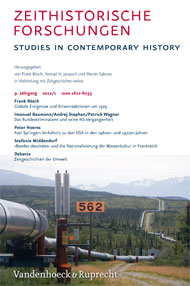The New Issue of “Zeithistorische Forschungen” of January 2012 is now available online and includes the following articles:
Frank Bösch Umbrüche in die Gegenwart
Umbrüche in die Gegenwart
Globale Ereignisse und Krisenreaktionen um 1979
When interpreting the 1970s today, special emphasis is placed on the socioeconomic and sociocultural changes which accompanied the oil crisis of 1973. By contrast, this article focuses on the reforms and reactions to the crises at the end of the 1970s. In 1979, in particular, a number of events with global repercussions prompted paradigm shifts. This article addresses historical events relating to energy, economics, and political and cultural transformation, and pays special attention to the significance now commonly ascribed to religion and history. All these occurrences and long-term trends can also be understood as manifestations of and practices of globalisation. Distant events such as the nuclear accident near Harrisburg, the change of power in Nicaragua, or the revolution in Iran, led (even in the Federal Republic of Germany) to new perceptions and patterns of behaviour. A transnational approach to events occurring before and after 1979 makes it possible to interpret anew key issues of contemporary history – issues which can only partially be answered with reference to the upheavals of 1989/90.
Imanuel Baumann/Andrej Stephan/Patrick Wagner (Um-)Wege in den Rechtsstaat, Das Bundeskriminalamt und die NS-Vergangenheit seiner Gründungsgeneration
The Bundeskriminalamt (Federal Criminal Police Office, abbreviated in German as BKA) was founded in 1951 and initially recruited its officers from the ranks of the National Socialist police force. A research project funded by the BKA in 2008 (the essential findings of which are presented in this essay) focused on three key questions. First, to what extent were the former Nazi staff able to influence the BKA ’s concepts and practice? Second, in what way did the experiences of policemen prior to 1945 shape the BKA? Third, how did people within the BKA talk about those members of the founding generation who had worked there during the National Socialist period? This essay shows that the former Nazi policemen employed by the BKA during the 1950s were keen to see if they could continue working according to concepts which had been adhered to before 1945. While these officers were increasingly urged to adapt to new circumstances during the 1960s, the reorganisation of the Criminal Police Office during the 1970s brought their influence to an end. Finally, the former National Socialist police members employed by the BKA after 1945 did not represent a realistic threat to the constitutional state. Nevertheless, their post-war careers continue to be a source of scandal, particularly for former victims of the National Socialist police. In this context, the authors’ analysis of different cultures of organisation and their transformation is relevant to studies in contemporary history as a whole.
Peter Hoeres Reise nach Amerika
Axel Springer und die Transformation des deutschen Konservatismus in den 1960er- und 1970er-Jahren
It is broadly assumed that the Axel Springer Press is pro-American. This fact has even been stipulated in the company’s guidelines since 2001. However, this article questions this assumption by drawing on media sources and unpublished German and American materials. It highlights Springer’s scepticism towards the USA, which has rarely been addressed in historical research. During the 1950s and 1960s, Springer expressed harsh criticism of America. The American administration therefore identified him as an opponent of their policies. Springer’s pro-American stance emerged later, during the struggle against the protest movement of the late 1960s and the conciliatory policies towards East Germany and Poland (Neue Ostpolitik). From this moment, anti-Americanism was sharply criticised in favour of what Springer called, in 1973, the ‘continuation of our course of action’. This development is characteristic of the history of German conservatism, whose pro-American stance from this moment onwards constituted a historic turnaround.
Stefanie Middendorf Modernitätsoffensiven, Identitätsbehauptungen:
„Bandes dessinées“ und die Nationalisierung der Massenkultur in Frankreich
After having originally been perceived as a threatening exponent of mass culture, comics (bandes dessinées) have now become a legitimate element of French national culture. The nationalisation of comics was achieved via the close surveillance of the youth press market, counter-cultural interpretations of the new medium by Catholics and Communists alike, the discovery of comics by the social sciences and, since the 1980s, by state funding. By scrutinising this complex process of national integration, this article suggests that it was precisely the comics’ ambivalence, on the borderline between commercial product and cultural commodity, which enabled them to be appropriated in France. This national adaptation of comics on the basis of an assault on ‘America’ and on the idea of ‘European culture’ is characteristic of national identity construction in Europe throughout the twentieth century.
